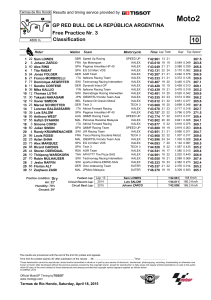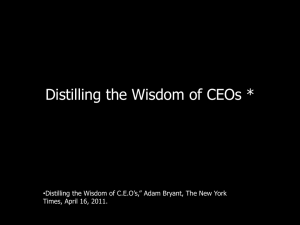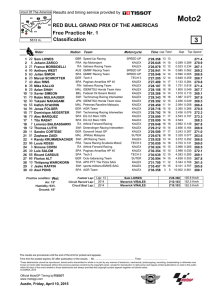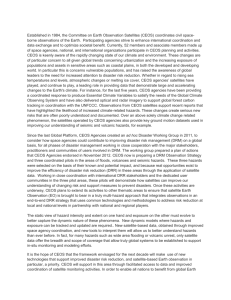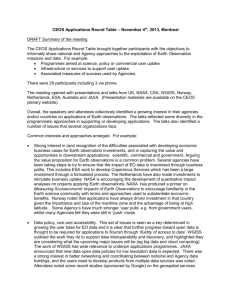Should leaders be specialists or generalists?
advertisement
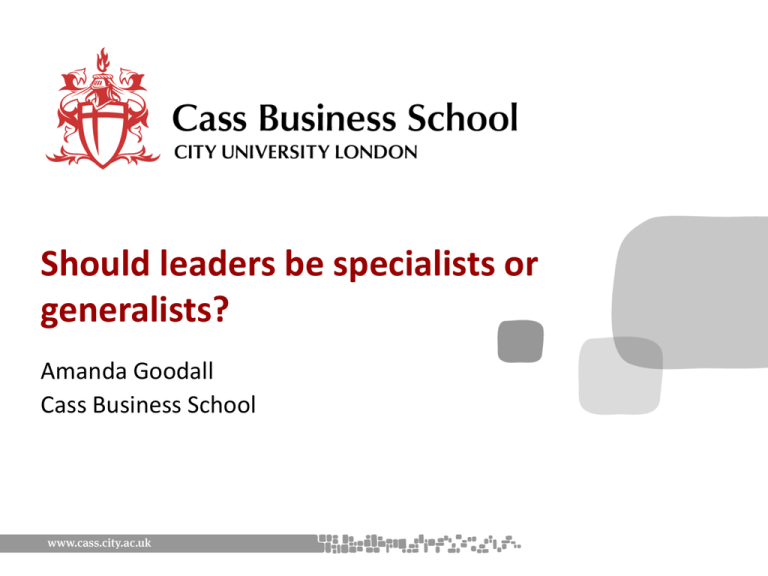
Should leaders be specialists or generalists? Amanda Goodall Cass Business School How much core-business knowledge should leaders have? How much core-business knowledge should leaders have? • How important is it that the Managing Director of McKinsey's was an outstanding consultant? How much core-business knowledge should leaders have? • How important is it that the Managing Director of McKinsey's was an outstanding consultant? • Do German automobile companies perform so well because engineers are on the shop floor and in the boardroom? MY KEY IDEA ‘Expert leaders’ Successful leaders are those who have a deep understanding of the core business of their organization. Being a capable general manager alone is not sufficient. Studying leaders can be problematic •There are thousands of books on the topic. •And many rely on personal or anecdotal accounts. Studying leaders can be problematic •It can be a difficult topic to research rigorously. •There are problems identifying the relationship between leadership and performance. The challenges of studying leaders Unlike in scientific experiments we cannot randomly assign a leader to an organization. But what if we could? David Cameron David Cameron Buranovskiye Babushki Silvio Berlusconi David Cameron Buranovskiye Babushki Retired Naturalists’ Society Mervyn King outgoing Governor of the Bank of England David Cameron Manure Management Co. Buranovskiye Babushki Silvio Berlusconi Victoria Beckam Retired Naturalists’ Society Mervyn King outgoing Governor of the Bank of England Our Current paper offers a new test of the influence of ‘expert leaders’: IZA Working Paper: EXPERT LEADERS IN A FASTMOVING ENVIRONMENT Amanda Goodall & Ganna Pogrebna We focus on an industry With a turnover of billions of dollars Objectively measurable performance Constant technological innovation Highly skilled individuals Formula 1 racing We examine the performance of every team in the six decades of Formula 1 championships between 1950 and 2011. Formula 1 racing After including a number of controls, we find that the most successful team leaders in F1 motor racing are more likely to have started their careers as drivers. How do you win in F1? • F1 compete for championship points. Each constructor enters two cars. • Points are given to the first 10 cars. • Most points awarded for podium position (1-3). How does F1 make its ? • The average annual budget of an F1 constructor team $200 million. • Teams’ profits mostly come from advertising revenue. What do F1 team principals do? Run the team determine strategy control technical matters make financial decisions oversee driver selection have final say on tactical decisions during each race. Our research question Can we identify the most effective kinds of leaders in Formula 1 Grand Prix racing? Our data •The performance of every car of each constructor in every F1 race between 1950 and 2011 (61 racing seasons). •Total of 19,535 car entries in 858 races. •Background information about the leaders of all F1 teams between 1950 and 2011. There are 4 types of team principals Manager-leaders •They move to F1 often from business. •Little or no experience in mechanics or driving. •Involvement in F1 comes later in life. Engineer-leaders •Are highly educated with degrees in engineering. •Gaining education means they enter competitive racing relatively late. Mechanic-leaders •Have practical technical experience in car making and repair. •Have not driven competitively nor obtained a degree in engineering. •Involvement in car mechanics usually happens quite early in life. Driver-leaders •Have competitive racing experience in F1 and other racing. •Are often familiar with the technical and mechanical aspects of car. •Usually start Go-kart racing as children and move to professional racing early 20s. Jenson Button Michael Schumacher Lewis Hamilton Michael Schumacher & Sebastian Vettel We first separate the data into those who have hands-on expertise (drivers and mechanics) and those who have less direct experience (general managers and engineering graduates). Former drivers and mechanics win twice as often as other kinds of F1 leaders Findings are robust to the inclusion of •CIRCUIT controls •YEAR controls •TEAM controls •# CARS included What’s driving the effect? Does the amount of driving experience make a difference? Does the amount of driving experience make a difference? •45 leaders out of 143 (32%) have ever had competitive driving experience. •35 are driver-leaders, 7 mechanicleaders, 2 engineers and 1 manager. Results 10 years racing experience by a leader is associated with 16% higher probability that the leader’s team will gain a podium position. - this is after controlling for the circuit, the year, the constructor and number of cars qualified. Who matters more, the driver or the leader? Who matters more, the driver or the leader? We look at an interaction between team principal’s - the leader’s former driving experience, and the F1 driving experience of the current team driver. Leader’s Former Driving Experience 0-5 years Over 5 years WORST OUTCOME AVERAGE TO GOOD OUTCOME BEST OUTCOME POOR OUTCOME AVERAGE TO GOOD OUTCOME GOOD OUTCOME POOR OUTCOME AVERAGE TO GOOD OUTCOME GOOD OUTCOME Zero years Over 5 years Current Driver’s Years of F1 0-5 Driving years Experience Zero years The background to the idea of ‘expert leaders’ Research universities My research question was: Who should lead research universities? Who should lead research universities? Good managers? Good scholars? I found that 1. The best universities in the world are led by top scholars. And … 1. The best universities in the world are led by top scholars. 2. Top scholars improve the later performance of their university. The same result exists for business schools To summarise Presidents who were top scholars make the best leaders of research universities. Current work – Chairs of US Economics Departments Change in performance of US economics departments •We look at the change in performance of 67 US economics departments over 14 years. •With co-authors John McDowell and Larry Singell. Change in performance of US economics departments We find that departments go on to improve when they are led by top researchers. These findings have been replicated, with coauthors, in other settings. Hospital CEOs • Hospitals were traditionally led by doctors but that has changed in the UK and US. • Of the 6,500 hospitals in the US, only 235 (4%) are now led by physicians. Empirical study of physician-leaders and hospital performance in the US •Hospital CEOs – physicians or non-MD CEOs? Empirical study of physician-leaders and hospital performance in the US •Hospital CEOs – physicians or non-MD CEOs? •CEOs in the top-100 hospitals in Cancer, Digestive Disorders, and Heart & Heart Surgery. (‘America's Best Hospitals’ 2009 U.S. News and World Report). Empirical study of physician-leaders and hospital performance in the US The higher a hospital’s performance score, the more likely it is that its CEO is a physician. Mean Index of Hospital Quality (IHQ) Score of Hospitals Led by Physician CEOs and Manager CEOs in Three Specialty Fields Physician CEO Manager CEO Index of Hospital Quality (IHQ) Scores 35 30 25 20 15 10 5 0 CANCER DIGESTION HEART The statistical analyses reveal that hospital quality scores are approximately 25% higher in physician-run hospitals than in the average hospital. Professional basketball •In longitudinal data we used information from 15,000 basketball games. •We controlled for a number of factors e.g. team budgets. •We found that star basketball players make better basketball coaches. •Basketball teams in the NBA won more games if led by coaches who were star players or had long playing careers. An important caveat Leaders’ expertise in the core business is not a proxy for management experience or leadership skills. Why might it matter if a leader is an expert in the core business? The transfer processes need to be understood empirically. Some possible explanations might include: Decisions and Actions Strategic choices Expert Leaders Expertise as a signal Theoretical model for expert leaders Decisions and Actions Knowledge-based strategy Expert Leaders Expert knowledge in the core business Create suitable work environment Informed evaluation and feedback Standard bearers in hiring choices Management & leadership experience Theoretical model for expert leaders Strategic choices Expert Leaders Expert knowledge in the core business Expertise as a signal Management & leadership experience To current employees: Credibility To potential employees: Attractive conditions To stakeholders (shareholders, investors): Strategic priorities Theoretical model for expert leaders Decisions and Actions Strategic choices Expert Leaders Expertise as a signal Theoretical model for expert leaders Potential weaknesses of expert leaders Can be prone to hubris. People who are outstanding experts and professionals may overemphasize their abilities in other areas. Potential weaknesses of expert leaders In addition to good management and leadership skills, the best-performing expert leaders may be those who show humility (a capability to listen to others) instead of hubris (expressed as over self-confidence). Future research needs to address 1. What are the boundaries of expert leadership? Future research needs to address 1. What are the boundaries of expert leadership? 2. Is it only applicable to knowledgeintensive organizations , professional service firms and also high skill settings? 3. Or does it have wider relevance? Thank you My work is available at: www.amandagoodall.com



